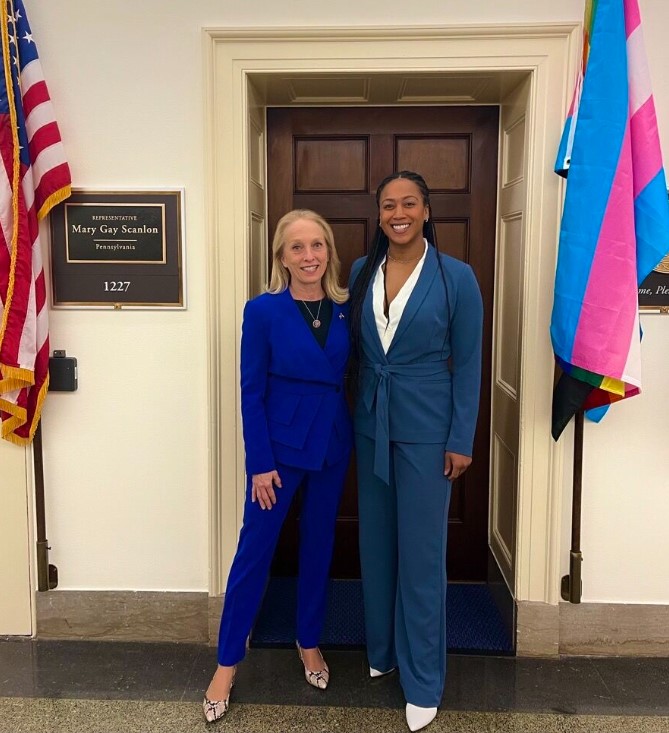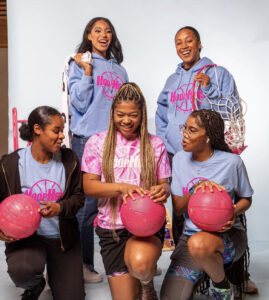February 22, 2023
Congresswoman Mary Gay Scanlon and Philadelphia Youth Basketball’s Randy Butler Attend the State of the Union Address

by: Madison Beecher
Earlier this month, Congresswoman Mary Gay Scanlon and Randy Butler, the Director of Program Operations & Impact at Philadelphia Youth Basketball, a member of the Collaborative attended this year’s State of the Union Address. We had the opportunity to catch up with Congresswoman Scanlon and Randy Butler after visiting the Capitol.
As a strong advocate for youth sports in Philadelphia, we asked Congresswoman Scanlon about the direction of youth sports at the federal level and ways to advocate:
Do you see the potential for certain federal departments to take the lead in creating new opportunities for youth to participate?
“Under the Biden Administration, the U.S. Department of Health and Human Services (HHS) champions the area of youth sports and nutrition. HHS departments, such as the Office of Disease Prevention and Health Promotion and the Office of Women’s Health, promote programs like the National Youth Sports Strategy and the Youth Engagement in Sports Initiative. I look forward to continuing to partner with HHS to promote these initiatives on both the local and federal levels.
As we take steps to curb violence in our communities, it is also important to center mentoring as an effective intervention and prevention tool and ensure community violence intervention programs geared towards young people have the resources to be part of that solution. I secured language in the FY2023 omnibus funding package urging the Department of Justice to direct resources to youth mentoring programs designed specifically for young people who have been impacted by trauma and violence. Of course, sports-based youth development shares these goals of mentoring young people and helping them to develop healthy habits and lifestyles, and I will continue to keep it a priority in federal legislation.”
How can the kids, parents, and coaches best advocate for their federal representatives for increased support?
“Kids, parents, and coaches can be great advocates for sports-based youth development (SBYD) programs by showing their representatives the benefits that these programs impart, both by inviting representatives to see the programs in action and sharing data regarding outcomes for participants. I know that I love the opportunity to hear from constituents about what issues matter most to them and how they are making a difference in our community, so I welcome the opportunity to visit SBYD programs. I encourage our regional advocates to share their hard work with my office by promoting their programming and arranging meetings to brainstorm possible federal interventions and support. The more visibility that youth sports-based development programs get, the further their reach and impact will be. I look forward to continuing to work with local stakeholders and advocates to ensure that all youth, and particularly girls, have the opportunity and access to play sports.”
Butler founded the program HoopHers at Philadelphia Youth Basketball to create a safe place for young women, offering them the opportunity to learn the game of basketball while simultaneously adopting the values of teamwork, self-confidence, and healthy living. Randy shared her experience visiting the capitol and her hopes for the future of sports-based youth development (SBYD):

How was your experience going down to the capitol Tuesday evening?“It was a surreal moment. I was completely honored to be Rep. Scanlon’s guest and represent the work that the city, and especially PYSC, is driving around SBYD.” Were there any interesting connections or conversations you had that stood out? “What really stood out to me was the network of women in Congress who are paying attention to the impact that positive youth development is playing in the lives of our young people and specifically in the lives of our young ladies. We spent part of the day connecting with other offices like Rep. Mikie Sherrill (New Jersey), who were also highlighting and honoring individuals doing work for girls in sport. Kelley O’Hara was a guest of Rep. Sherrill and we spent some time talking about the impact that sport played in each of our lives. We shared stories about confidence building, discipline, representation, equity, and the importance of uplifting women’s journeys and stories. Being in the room with these powerful women leaders who understand the impact and importance that sport has for our young ladies is something I’ll never forget–and hearing them affirm that the conversation and their advocacy for girls and women in sport don’t end in that room, was very inspiring.” |
What does it mean to have an ally like Rep. Scanlon who supports great efforts like HoopHers, your work at PYB, and our efforts across Philadelphia? “Rep. Scanlon is so much more than an ally. She’s a role model for women in leadership and puts into practice what it means to take action. She shows up to community events, wants to understand the issues, and listens to what her community needs to thrive. We spent quite some time talking at length about HoopHers and the efforts of SBYD in similar organizations across Philadelphia. Rep. Scanlon and her staff were curious to learn more about how they can support and we spent some time brainstorming together what networks and resources they could add to our programs. When I speak about the work that it takes for our young people to feel and be whole, I often share that ‘it takes a village,’ Rep. Scanlon and her staff are active participants in our ‘village,’ and they want to do more!” |
What did you hear in President Biden’s remarks that stuck out as it relates to our work here in Philadelphia?
“One of the topics that really stuck with me following the President’s speech and the work we do with our youth was the point of being past the grip that the COVID crisis had on us as a nation and especially for our young people–with school closures, OST activities canceled, programs shut down—yes, we’ve come a long way, and yes there is still work to be done. I find this incredibly important for the work that we do with youth in our city. So many of the important years of their development were shaken up by covid and hearing from parents about their young people, and the youth themselves about how much their mental health struggled during those ‘shut down’ periods.
Even more, when the President acknowledged that ‘millions of young people are struggling with bullying, violence, and trauma, we owe them greater access to mental health care…’
SBYD and especially members of the collaborative are working to play an important role in helping to address and facilitate mental health and well-being. Organizations like The Center For Healing and Justice Through Sport (CHJS) are a great example of equipping coaches with simple, practical skills and knowledge about the brain which are proven to have therapeutic impacts. Additionally, seeing the investment that PYSC has taken in building access and capacity for coaches to have the necessary tools and skills to help our young people navigate their mental health is huge in terms of taking steps to help drive healthier positive outcomes.”
What kind of benefits from sports-based youth development have you seen in the youth from your program?
“At PYB, we’ve been working hard to focus on safe spaces for young people to connect with positive caring role models, peers, and communities. In a time (covid era, racial injustice, high violence in our city) where young people lost so much of their connection with the spaces that allowed them to develop socially, emotionally, physically, civically, etc., we’re doubling down on uplifting our young people’s social and emotional learning (SEL) skills and we’re seeing deeper connections in mentorship and peer to peer relationships, an increase in SEL outcomes–like confidence, self-management, teamwork, leadership, and growth mindsets. We’re seeing our young people’s mindsets grow from ‘I can’t’ to ‘I’ll give it a try,’ and ‘yes I can.'”
